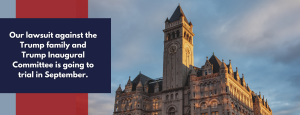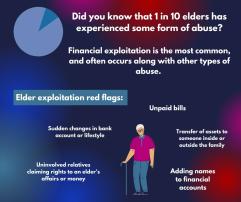We Secured Nearly $80 Million for DC, including from the Sackler Family & Purdue Pharma, to Support Victims of the Opioid Crisis
Today, attorneys general from the District and eight other states reached a landmark agreement that requires the Sackler family and Purdue Pharma to pay a total of up to $6 billion – an additional $1.7 billion more than an initial agreement that some states agreed to last year. It resolves the family’s and Purdue Pharma’s liability for creating, exacerbating, and profiting from the opioid crisis with the addictive painkiller, OxyContin.
This agreement holds the Sacklers and Purdue Pharma financially accountable for the central role they played in creating and profiting from the opioid epidemic, which has tragically taken the lives of more than a million Americans.
My team and I led the negotiations, and helped secure additional funds for the District. This deal brings our total for the District from Purdue and the Sacklers to over $31 million – nearly four times the amount we would have received under the initial deal – and will be used to help victims of opioid abuse and addiction get needed support and treatment. No one, no matter how big or powerful, will get away with risking the health and safety of vulnerable District residents.
Just last week, I announced the District will receive over $47 million from a settlement with the opioid manufacturer Johnson & Johnson and three leading opioid distributors. Like the Purdue and Sackler funds, these proceeds will be used to support District residents struggling with opioid addiction. Learn more about it here from WTOP.
As a result of our office’s efforts to hold those accountable for the opioid crisis, we have secured a total of nearly $80 million across several settlements, including today’s announcement, for the District that will all be used to help District residents struggling with opioid abuse and addiction.
In DC, we continue to see the harsh impacts this crisis has had on vulnerable residents. In the District, fatal opioid overdoses increased by 46% from 2019 to 2020, and they disproportionately impacted Black residents, who accounted for 84% of overdose fatalities in the last six years.
Sadly, we can’t bring back those who lost their lives because of these addictive and dangerous drugs, but these funds can help save lives. We will continue to hold accountable those responsible for the opioid crisis, and we’ll keep seeking to secure resources to help residents who have been affected by the crisis.
Thank you.
Karl A. Racine
Attorney General
What’s the Problem with Ghost Guns?
There are too many guns flooding our city and far too many loopholes that enable those floodgates to remain open. Across the country and in the District, a common culprit has become clear: ghost guns.
That’s why my office has been going after ghost gun manufacturers to stop them from selling to District residents and calling for further action to crack down on these dangerous weapons.
DC has some of the country's strongest gun laws, but most guns in DC are brought in from other states that have less restrictive laws, which means we need a nationwide effort to stop the flow of illegal guns, including ghost guns.
To learn more about these untraceable, undetectable guns, and how my office is cracking down on them, read this explainer on my Medium page.
Celebrating Black History Month in February
My office celebrated Black History Month in February by posting 10 things you probably didn’t know about Black DC’s history. When people talk about DC, they’re quick to talk about the monuments on the National Mall, the White House, and Capitol Hill.
But our city’s history—especially its Black history—extends beyond this. For example, did you know that Benjamin Banneker, a free Black man and tobacco farmer, helped map out and plan DC? To learn other facts about DC’s Black history, check out this post on my Medium page.
We also posted weekend reads on local Black history throughout the month that you might find interesting. These articles highlighted the origins of Black History Month, the roots of Soul Food in DC, the contributions of Black women in the struggle for freedom, and the real history of some of our local landmarks.
And just last Thursday, I hosted a virtual discussion with Derek Musgrove, co-author of Chocolate City: A History of Race and Democracy in the Nation’s Capital. We discussed DC’s history as the capital of Black America and how that history is intertwined with Black history nationwide and around the world. If you missed it, you can view our discussion here.
And although February is nationally recognized as Black History Month, let’s remember that recognizing Black History should happen every day.
Lawsuit Against Trump’s Presidential Inaugural Committee & Trump Entities Is Going to Trial in September 2022
In 2020, my office sued Donald Trump’s Presidential Inaugural Committee (PIC), Trump International Hotel, and the Trump Organization for misusing more than $1 million of nonprofit funds to unlawfully enrich the Trump family—and now our case is going to trial against all of the defendants in September. No one is above the law, and I’m working to get that money back and make sure it goes to real nonprofits doing civic-focused work.
In the suit, we allege that the PIC spent more than $1 million to use event space at the Trump Hotel at vastly inflated prices. The PIC also paid off a debt of the Trump Organization that was unrelated to the PIC for rooms at another hotel. This blatant misuse of nonprofit funds is a pattern that surrounds the Trump family—and mirrors conduct that led the New York Attorney General to shut down the family’s private foundation several years ago. My office won’t allow this type of corruption to stand.
To learn more about the case, read this CNN article.
Talking with St. John's College High School Seniors
Last week, in honor of Black History Month in February, I spoke to the senior class at St. John's College High School. During this event, I shared my perspective as an alumnus, discussed my role as Attorney General, and encouraged the students to make a difference in their communities—whether by participating in tough conversations, volunteering in their communities, voting in every local, state, and federal election, or using their voice to speak out—and how they can live out St. John's College High School’s values of respect for all persons, concern for those who are struggling, and social justice in college, their careers, and beyond.
Reporting Elder Financial Abuse
Did you know that 1 in 10 seniors has experienced some form of financial abuse? In the District, we have 83,000 residents who are 65 years old or older and may be at risk of being scammed. Types of scams include: telemarketing, charity, identity theft, prize and sweepstakes, and relative in distress scams. Unfortunately, far too often, financial exploitation goes unreported, which can cost seniors their precious resources.
Learn the red flags to watch out for and contact our Elder Justice Section if you see something concerning. We regularly take action to strip financial abusers of credentials, return funds to seniors, and take abusers to court. Email: elderjustice@dc.gov or call (202) 727-3807.
Welcoming Our Office’s 2022 Charles F.C. Ruff Fellows
Last week, I welcomed 16 recent graduates from local law schools to my office for the 2022 Charles F.C. Ruff Fellowship. In 2012, the office established the year-long fellowship to promote public interest legal work and give recent law school graduates the opportunity to practice law as Assistant Attorneys General in the District of Columbia. Some of the top attorneys at my office started as Ruff Fellows, and others have gone on to have exceptional careers in public service building on their experience as fellows. The 2022 class includes graduates from Georgetown University Law Center, George Washington University Law School, George Mason University Antonin Scalia Law School, the University of Virginia School of Law, and the University of the District of Columbia David A. Clarke School of Law. Click here to learn more about them.
Tenant Alert: You Have a Right to Stay Warm in Your Apartment
The Office of the Attorney General stands up against landlords who force tenants to live in squalor so they can turn a profit. We sued landlords in Northeast DC for forcing tenants to live in illegal and unsafe conditions, including weeks without heat. No family should have to live without access to heat. Every tenant has the legal right to have their unit heated to 68 degrees during the day and 65 at night, from October to May. Read about your right to heat and how we can help in our tenant alert.
Consumer Alert: T-Mobile customers should take action to protect their identities, as their data may be for sale on the dark web
On August 17, 2021, T-Mobile reported a massive data breach which compromised the sensitive personal information of millions of current, former, and prospective T-Mobile customers. The breach affected more than 53 million people, including 243,680 District residents. Millions had their names, dates of birth, Social Security Numbers, driver’s license, and other information compromised.
Residents who were impacted by the massive data breach announced by T-Mobile in August 2021 are at heightened risk of identity theft and should take steps to protect their information from identity theft. Recently, a large subset of the information compromised in the breach was discovered for sale on the dark web—a hidden portion of the Internet where cyber criminals buy, sell, and track personal information.
If you were affected, click here to learn how to protect yourself.




